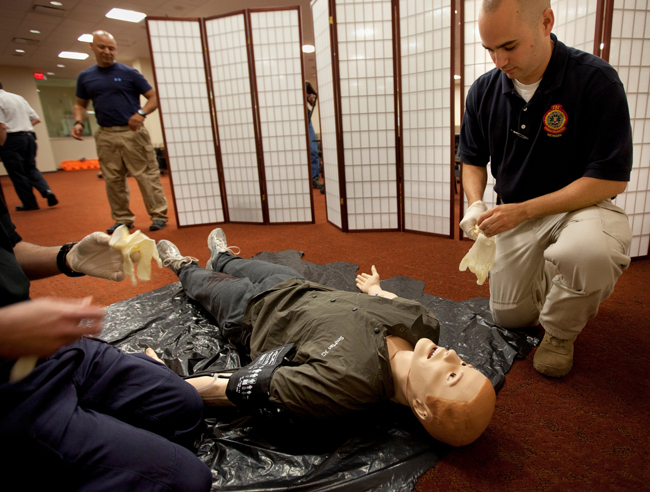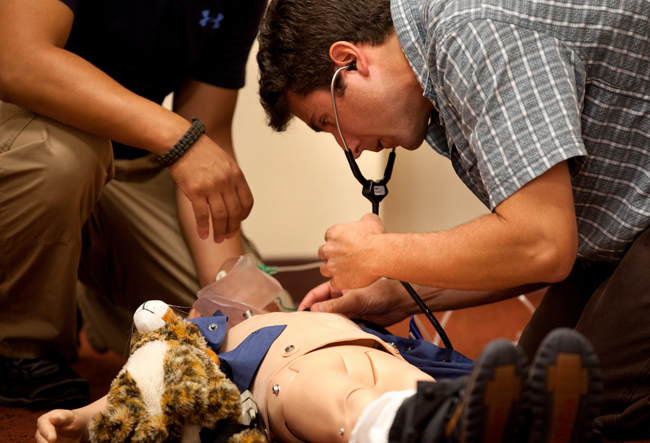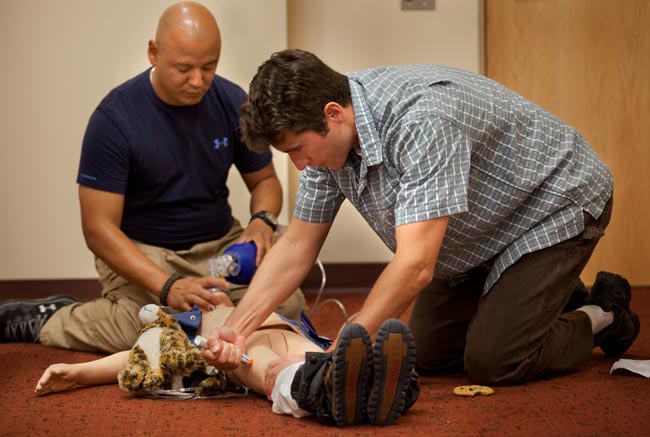Holy Name Press Releases
Contact Us
FBI Receives Training at Holy Name Medical Center's Institute For Simulation Learning
September 12, 2013
On Monday, September 9, 2013, 12 members of the NY and Newark based FBI Operational Medicine Program participated in a customized simulation training program offered by the Institute for Simulation Learning at Holy Name Medical Center.
The training event included the use of Holy Name's high fidelity human patient simulators and trained simulation staff to recreate medical scenarios the FBI participants may encounter in the line of duty.
The scenarios, written and implemented by the Institute for Simulation Learning, were customized for the FBI using the most recent bureau-established protocols to treat victims of a shooting, a stabbing, an anaphylactic reaction and a spinal injury.
Ray Dwyer, the EMS (Emergency Medical Services) Manager and Clinical Coordinator for Holy Name Medical Center's EMS Services, provided training related to anaphylactic shock and EpiPen® administration. Additional skill training including airway management and cervical spine immobilization was offered prior to the simulation exercise.
The training was well received by the participants who validated its relevance to their duties.
Cedar Wang, MSN, RN, GNP-BC, CHSE, Director of Simulation Learning at Holy Name says, "We anticipate that the training developed for the FBI can be offered to other law enforcement agencies and municipalities in the area."
Premier Interdisciplinary Education at the Institute for Simulation Learning
The Institute for Simulation Learning at Holy Name Medical Center represents the leading edge in clinical education by offering an authentic, immersive environment for healthcare professionals to develop safe, innovative and compassionate approaches to patient care.
The Institute for Simulation Learning provides premier interdisciplinary education and functions as a system-wide think tank that allows the healthcare team to replicate challenging medical, as well as non-medical, situations with the goal of optimizing real-world outcomes. Advanced technology and authentic scenarios are designed to refine skills and to foster team collaboration and communication.
The professional simulation staff incorporates evidence-based principles and practices to improve the quality, safety and efficiency of healthcare delivery.
Authentic Scenarios Unfold in a Controlled Setting
Simulation education with computer-controlled technology and standardized patients (actors), enables clinicians, administrators, students and corporate professionals to improve their performance by developing and practicing techniques, skills and protocols without compromising the safety of real patients.
High-fidelity patient simulators—an adult male, a pregnant female, a child, and an infant that blink, breathe and have a heartbeat—replicate almost every bodily function and produce accurate responses to the caregiver's interventions. These virtual patients, in addition to standardized patients (actors), advanced audiovisual systems and trained simulation staff, provide the ideal context for modern healthcare training and continuing education.
Learners apply their skills in realistic clinical encounters that represent a wide spectrum of diagnoses, and/or situations involving both clinical and interpersonal skills such as obstetric emergency, cardiac arrest, delivering bad news, counseling and conflict resolution—the customized learning opportunities are unlimited.
To learn more about the Institute for Simulation Learning, visit www.holyname.org/Simulation.



